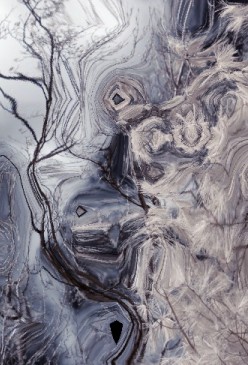 ould an AI, if one existed, produce a creative work of art?
That question gets us immediately to the next question: What is art?
Is a banana duct-taped to the wall art? Is hateful political graffiti,
where a woman dressed as a 1950s housewife is shown murdering her husband
by throwing him in a trash bin, art? Or do we take the anthropologist's
view that anything people do, such as picking up garbage, is a cultural
activity?
ould an AI, if one existed, produce a creative work of art?
That question gets us immediately to the next question: What is art?
Is a banana duct-taped to the wall art? Is hateful political graffiti,
where a woman dressed as a 1950s housewife is shown murdering her husband
by throwing him in a trash bin, art? Or do we take the anthropologist's
view that anything people do, such as picking up garbage, is a cultural
activity?
Some say that AI is only capable of mimicry. An AI slurps the Internet, recombines whatever trash it finds, and spits out new trash. I am by no stretch of the imagination an artist (for proof see the image below), but it seems to me that while this definition is appropriate for what corporate America thinks is "AI", it's heavy on the "A" and light on the "I", which indeed seems to be a fair description of much of our current culture.

An example of computer generated art. For a mere $1,500,000.00 you can have the original image in your own museum! A banana and six inches of duct tape are included with purchase
What artistic types appear to struggle with is the need to avoid kitsch, sentimentality, and artificiality. Say what you will about twelve-tone serial music of the 20th century, or for that matter the blurry rectangles and swirly dribbles of paint in visual art of that period, but one thing you can't say is that it was created by mashing pre-existing things together. The ‘modern’ genre was invented to eliminate artificiality and, as much as possible, people. If the goal was to eliminate ideas, it utterly failed: listen to Glenn Gould's rendition of Schönberg's works and you can hear the composer's ideas trying to break free.
I suspect the need to eliminate the human element also explains these new linguistic constructions like ‘non-man,’ ‘person of color,’ and ‘neurodivergent.’ They're not really designed to eliminate stigma as is claimed, but to eliminate the idea that we're talking about a human being, much as bureaucratese strives to do—not to avoid offending you, but because the bureaucrat regards you as just another burden to be eliminated before he can go home and do whatever bureaucrats do when they're not ignoring you.
Seriously, if they are trying to eliminate offense, why are they running around calling everybody racist?
For many people, anything manmade, no matter how skillfully it was done, feels artificial and pretentious, a form of mimicry. Thus the idea, popular a while back, of nature sounds. Unfortunately, in one case, the recordings of thunderstorms and whales were accompanied by the dinging sound of the artist's SUV, the door of which was left open and plainly audible throughout the recording. Maybe he was trying to tell us that these artificial sounds are so prevalent we don't notice them. Or maybe he just didn't notice them.
Another time some astrophysicists released a record produced by converting radiation measurements of solar activity into sounds. The sounds were, of course, not real, but computer-generated and fake-sounding. It seemed to me that it would have been better just to plot the data on an appropriately labeled X-Y graph like everybody else.
“AI”-generated images have the same element of fakeness. Maybe that will help the humans understand that computer predictions, whether about climate or disease, have no independent validity but are solely products of whoever created them. The fact that a computer was used has no bearing on whether they are correct.
If we want an AI to produce art, intention is one trait that it would need to possess. Intention alone is probably not enough: it would have to be the intention to communicate some particular idea. To do that, the AI would have to be able to have ideas, which is to say to conceptualize objects in the real world and the relationships among them and propose a novel or interesting way to express them.
Some people adopt the political view that the sole purpose of art is to shock and annoy the viewer to shake them out of their complacency. Anyone with a cell phone knows that computers already possess this ability. As for shocking people, that's an area that old CRT monitors are better at, but computers can still do it if the circuit is suitably modified.
To produce a culturally significant work, an AI would also need the ability to experience something that speaks more to humans on a deeper level than mere annoyance. It's a tough challenge, and one that current “AI” lacks. As scientists say, more research is needed.
jun 17 2023, 6:15 am
